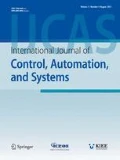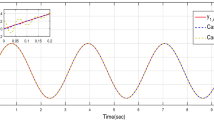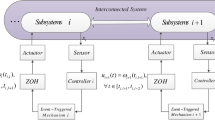Abstract
The decentralized event triggered control problem is investigated for nonlinear interconnected systems in strict-feedback form subjected to parametric uncertainty. For each subsystem in the interconnected systems, the decentralized adaptive backstepping controller is designed to guarantee that the tracking error is semi-globally ultimately bounded. The control update and parameter estimate action are aperiodical executed only when the desired control specifications cannot be ensured, drastically reducing the computational burden and the transmission cost. It can be proved that zeno phenomenon is avoided as a positive lower bound on the minimal inter-sample time exists. The impulsive dynamical systems tools and Lyapunov analysis are introduced to prove the stability property for closed-loop system. Finally, a numerical simulation example is included to validate the effectiveness of the control scheme.
Similar content being viewed by others
References
C. Wang, C. Wen, Y. Lin, and W. Wang, “Decentralized adaptive tracking control for a class of interconnected nonlinear systems with input quantization,” Automatica, vol. 81, pp. 359–368, 2017.
G. Zong, H. Ren, and L. Hou, “Finite-time stability of interconnected impulsive switched systems,” IET Control Theory & Applications, vol. 10, no. 6, pp. 648–654, 2016.
X. Guo, J. Wang, F. Liao, and R. S. H. Teo, “Distributed adaptive sliding mode control strategy for vehicle-following systems with nonlinear acceleration uncertainties,” IEEE Transactions on Vehicular Technology, vol. 66, no. 2, pp. 981–991, 2017.
G. Zong and D. Yang, “H∞ synchronization of switched complex networks: a switching impulsive control method,” Communications in Nonlinear Science and Numerical Simulation, vol. 77, pp. 338–348, 2019.
X. Guo, J. Wang, F. Liao, and R. S. H. Teo, “Distributed adaptive integrated-sliding-mode controller synthesis for string stability of vehicle platoons,” IEEE Transactions on Intelligent Transportation Systems, vol. 17, no. 9, pp. 2419–2429, 2016.
B. Tian, H. Lu, Z. Zuo, and W. Yang, “Fixed-time leader-follower output feedback consensus for second-order multiagent systems,” IEEE Transactions on Cybernetics, vol. 49, no. 4, pp. 1545–1550, 2019.
J. Huang and Q.-G. Wang, “Decentralized adaptive control of interconnected nonlinear systems with unknown control directions,” ISA Transactions, vol. 74, pp. 60–66, March 2018.
Y.-X. Li and G.-H. Yang, “Graph-theory-based decentralized adaptive output-feedback control for a class of nonlinear interconnected systems,” IEEE Transactions on Cybernetics, vol. 49, no. 7, pp. 2444–2453, July 2019.
X.-J. Li and G.-H. Yang, “Neural-network-based adaptive decentralized fault-tolerant control for a class of interconnected nonlinear systems,” IEEE Transactions on Neural Network and Learning System, vol. 29, no. 1, pp. 144–155, 2018.
Y. Li and S. Tong, “Adaptive neural networks decentralized FTC design for nonstrict-feedback nonlinear interconnected large-scale systems against actuator faults,” IEEE Transactions on Neural Network and Learning System, vol. 28, no. 11, pp. 2541–2554, 2017.
H. Ren, G. Zong, L. Hou, and Y. Yang, “Finite-time resilient decentralized control for interconnected impulsive switched systems with neutral delay,” ISA Transactions, vol. 67, pp. 19–29, 2017.
Y. Li and G. Yang, “Model-based adaptive event-triggered control of strict-feedback nonlinear systems,” IEEE Transactions on Neural Network and Learning System, vol. 29, no. 4, pp. 1033–1045, 2018.
C. Hua, K. Li, and X. Guan, “Decentralized event-triggered control for interconnected time-delay stochastic nonlinear systems using neural networks,” Neurocomputing, vol. 272, pp. 270–278, 2018
H. Ren, G. Zong, and T. Li, “Event-triggered finite-time control for networked switched linear systems with asynchronous switching,” IEEE Transactions on Systems, Man, and Cybernetics: Systems, vol. 48, no. 11, pp. 1874–1884, 2018.
H. Ren, G. Zong, and H. R. Karimi, “Asynchronous finite-time filtering of networked switched systems and its application: an event-driven method,” IEEE Transactions on Circuits and Systems I, vol. 66, no. 1, pp. 391–402, 2019.
B. Tian, J. Cui, H. Lu, and Q. Zong, “Reentry attitude control for RLV based on adaptive event-triggered sliding mode,” IEEE Access, vol. 7, pp. 68429–68435, 2019.
V. Narayanan and S. Jagannathan, “Event-triggered distributed control of nonlinear interconnected systems using online reinforcement learning with exploration,” IEEE Transaction on Cybernetics, vol. 48, no. 9, pp. 2510–2519, 2018.
V. Narayanan and S. Jagannathan, “Event-triggered dDistributed approximate optimal state and output control of afne nonlinear interconnected systems,” IEEE Transaction on Neural Network and Learning System, vol. 29, no. 7, pp. 2846–2856, 2018.
V. Narayanan, A. Sahoo, S. Jagannathan, and K. George, “Approximate optimal distributed control of nonlinear interconnected systems using event-triggered nonzero-sum games,” IEEE Transactions on Neural Networks and Learning System, vol. 30, no. 5, pp. 1512–1522, May 2019.
Z. Gu, P. Shi, D. Yue, and Z. Ding, “Decentralized adaptive event-triggered H∞ filtering for a class of networked nonlinear interconnected systems,” IEEE Transaction on Cybernetics, vol. 49, no. 5, pp. 1570–1579, May 2019.
S. Zheng, P. Shi, S. Wang, and Y. Shi, “Event triggered adaptive fuzzy consensus for interconnected switched multiagent systems,” IEEE Transaction on Fuzzy Systems, vol. 27, no. 1, pp. 144–158, 2019.
C. Hua, K. Li, and X. Guan, “Decentralized event-triggered control for interconnected time-delay stochastic nonlinear systems using neural networks,” Neurocomputing, vol. 272, pp. 270–278, 2018.
C. Wen, “Decentralized adaptive regulation,” IEEE Transactions on Automatic Control, vol. 39, no. 10, pp. 2163–2166, 1994.
X. Ye, “Decentralized adaptive stabilization of large-scale nonlinear time-delay systems with unknown high-frequency-gain signs,” IEEE Transactions on Automatic Control, vol. 56, no. 6, pp. 1473–1478, 2011.
C. Wen, J. Zhou, and W. Wang, “Decentralized adaptive backstepping stabilization of interconnected systems with dynamic input and output interactions,” Automatica, vol. 45, no. 1, pp. 55–67, 2009.
L. Liu and X. Xie, “Decentralized adaptive stabilization for interconnected systems with dynamic input-output and nonlinear interactions,” Automatica, vol. 46, no. 6, pp. 1060–1067, 2010.
S. J. Yoo, J. B. Park, and Y. H. Choi, “Decentralized adaptive stabilization of interconnected nonlinear systems with unknown nonsymmetric dead-zone inputs,” Automatica, vol. 45, no. 2, pp. 436–443, 2009.
B. Niu, Y. Liu, G. Zong, Z. Han, and J. Fu, “Command filter-based adaptive neural tracking controller design for uncertain switched nonlinear output-constrained systems,” IEEE Transactions on Cybernetics, vol. 47, no. 10, pp. 3160–3171, 2017.
L. Cao, H. Ma, Q. Zhou, and H. Li, “Adaptive decentralized control for large-scale nonlinear systems with event-triggered mechanism and actuator failures,” Youth Academic Annual Conference of Chinese Association of Automation, Nanjing, China, pp. 743–748, 2018.
Y. Li and G. Yang, “Event-triggered adaptive backstepping control for parametric strict-feedback nonlinear systems,” International Journal of Robust and Nonlinear Control, vol. 28, pp. 976–1000, 2018.
C. Wang, C. Wen, and Y. Lin, “Decentrialized adaptive backstepping control for a class of interconnected nonlinear systems with unknown actuator failures,” Journal of the Franklin Institute, vol. 352, no. 3, pp. 835–850, 2015.
Author information
Authors and Affiliations
Corresponding author
Additional information
Publisher’s Note Springer Nature remains neutral with regard to jurisdictional claims in published maps and institutional affiliations.
Recommended by Associate Editor Guangdeng Zong under the direction of Editor Hamid Reza Karimi. This study was funded by National Natural Science Foundation of China (Grant No. 61603274), Research Project of Tianjin Municipal Education Commission(Grant No.2017KJ249), National Natural Science Foundation of China (Grant No. 61673294), and Natural Science Foundation of Tianjin City (Grant No. 18JCQNJC74600).
Yuehui Ji received her B.S. and Ph.D. degrees from School of Electrical Engineering and Automation at Tianjin University, China, in 2009 and 2012, respectively. She is currently working as a lecturer in School of Electrical and Electronic Engineering, Tianjin University of Technology, China. Her research interests include nonlinear adaptive control, decentralized control for interconnected systems.
Hailiang Zhou received his B.S. and Ph.D. degrees from School of Electrical Engineering and Automation at Tianjin University, China, in 2009 and 2012, respectively. He is currently working as a Senior Engineer in Tianjin Institute of Metrological Supervision and Testing(TIMST), China. His research interests include nonlinear control, tracking control for quadrotor.
Qun Zong received his B.S. and Ph.D. degrees from School of Electrical Engineering and Automation at Tianjin University, China, in 1988 and 2003, respectively. He is currently working as a Professor in School of Electrical and Information Engineering, Tianjin University, China. His research interests include guidance control and simulation for aircraft, formation and coordination control for multi-agent systems, fault diagnosis and fault-tolerant control.
Rights and permissions
About this article
Cite this article
Ji, Y., Zhou, H. & Zong, Q. Decentralized Adaptive Event-triggered Control for Nonlinear Interconnected Systems in Strict-feedback Form. Int. J. Control Autom. Syst. 18, 980–990 (2020). https://doi.org/10.1007/s12555-019-0461-2
Received:
Revised:
Accepted:
Published:
Issue Date:
DOI: https://doi.org/10.1007/s12555-019-0461-2




